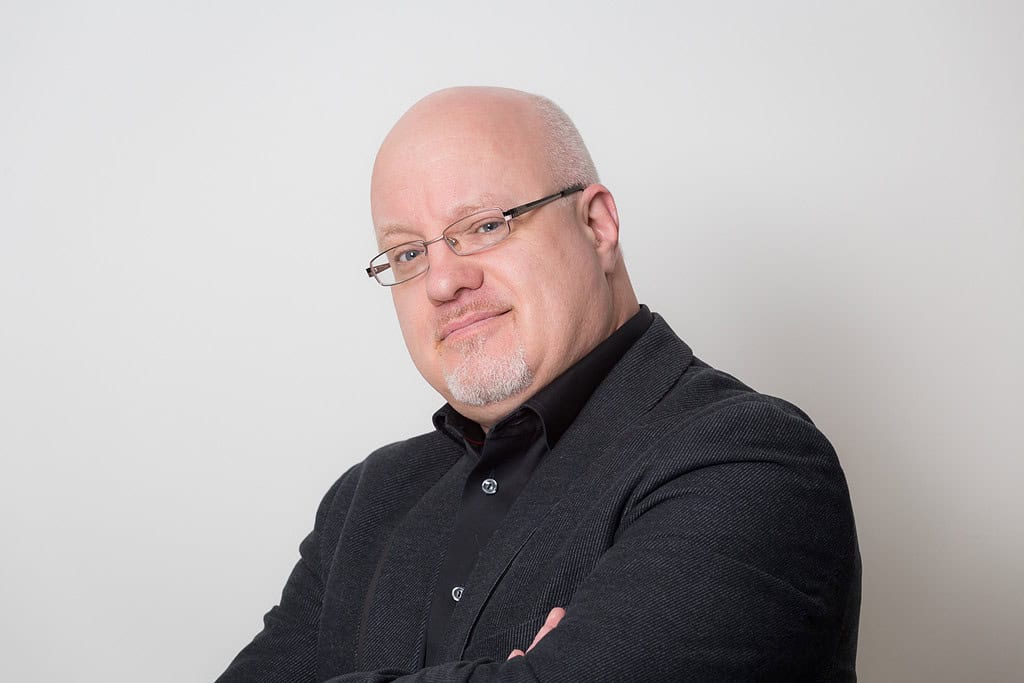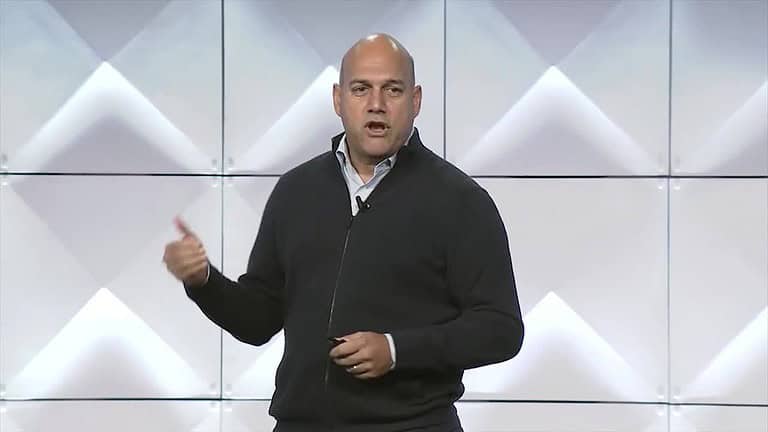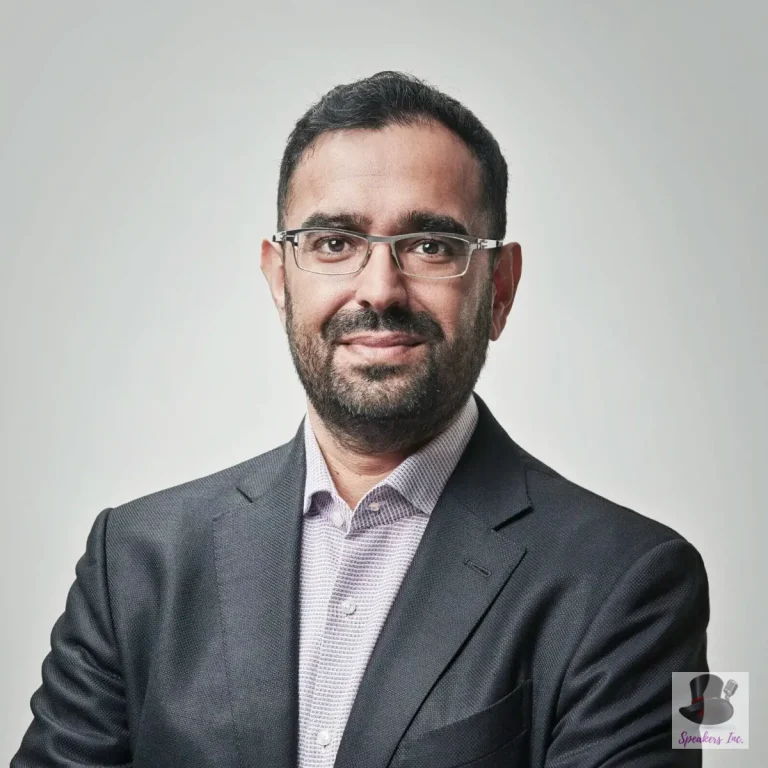Brett King: Business Futurist
Futurist and banking innovator who helps financial leaders design customer-centric digital services, leverage AI and automation, and map future revenue models.
Quick Facts:
- Highlights:
- Brett King is celebrated globally for his profound insights into the future of business, technology, and society. His dynamic presentations captivate audiences and offer a visionary outlook on the digital age.
- As the driving force behind Moven, a pioneering mobile banking startup, King has redefined personal finance management. His innovative approach to digital banking has set new industry standards.
- Brett King hosts the popular radio show and podcast Breaking Banks, which features interviews with industry leaders and innovators. The show provides listeners with cutting-edge insights into fintech and the future of finance.
- Formats: Keynote, Executive Briefing
- Audiences: Banking and fintech leaders (20–150); Conferences (200–2,000)
- Outcomes:
- Reframe products for digital customer journeys.
- Identify automation opportunities with measurable ROI.
- Create a roadmap for future revenue streams.
- Travels from: New York, NY
- **Fee range: $35,001 - $50,000
Talent Services
Keynote Topics:
Branch Today, Gone Tomorrow: Becoming A Digital First Bank
The Pandemic halted branch growth globally, the question remains whether there will be a return to pre-pandemic levels, or whether the era of true digital first banking is upon us. The question that Brett King tackles in this new keynote include:
- Honest metrics to evaluate branch viability?
- How can branch networks support digital?
- How does neo-bank cash efficiency redefine the balance sheet?
- What about ATM networks?
The transition from a branch-led business to a digital-first bank, will take culture, technology, investment and policy rethinking.
The Rise Of The Challengers
How Neo-banks Changed The Rules And How The Industry Responded
From the first Internet-only banks like Egg and Jibun bank, to the emergence of the first Fintech Neo-Banks, the first chartered Challenger Banks and the Industry copy-cat’s, Brett King takes us on a tour of the decade of disruptor banks.
We examine the success stories, and failures, along with why there are so little examples of incumbent success in attempting to replicate these new models. What does it mean for future market share, for the industry as a whole and for the future of banking?
The Rise of Techno-socialism
The 21st century is going to be the most disruptive, contentious period humanity has ever lived through. It will challenge our most sacred ideologies around politics, economics and social constructs. It will force humanity to adapt in ways we can’t yet imagine.
There is much to be highly optimistic about, but it will require humanity to unite in respect to our collective goals and purpose. With the emergence of Artificial Intelligence (AI) we are on the verge of perhaps solving the biggest mysteries of the universe. AI will allow us to automate society to provide untold abundance and prosperity, but it brings with it vast disruption to our current working practices. We will soon have the technology to extend our lifespan, to make humanity a multi-planetary species, and to provide for the basic needs of every man, woman and child on the planet, but will this be widely distributed or only for the richest?
The future holds much promise, but today we have the global pandemic, the worst inequality in centuries, emerging large-scale techno-unemployment from AI, and the impact of climate change – creating the worst economic uncertainty the world has ever faced. How do we transition into an optimal future for humanity when we see growing chaos and uncertainty? Join us at this exclusive keynote for TransUnion as we explore together our possible futures and choices.
AUGMENTED: Life in the Smart Lane
The internet and smartphone are just the latest in a 250 year long cycle of disruption that has continuously changed the way we live, the way we work and the way we interact. The coming Augmented Age, however, promises a level of disruption, behavioral shifts and changes that are unparalleled.
While consumers today are camping outside of an Apple store waiting to be one of the first to score an Apple Watch, the next generation of wearables will be able to predict if we’re likely to have a heart attack and recommend a course of action. We watch news of Google’s self-driving cars, but don’t likely realize this means progressive cities will have to ban human drives in the next decade because us humans are too risky.
Following on from the Industrial or Machine Age, the Space Age and the Digital Age, the Augmented Age is based on four disruptive themes – Artificial Intelligence, Experience Design, Health Tech and Smart Infrastructure.
Historically the previous ‘ages’ bought significant disruption and changes, but on a net basis the jobs were created, wealth was enhanced, and the health and security of society improved. What will the Augmented Age bring?
Will robots take our jobs, and AI’s subsume us as inferior intelligences, or will this usher in a new age of abundance? Augmented age is a book on future history, but more than that, it is a story about how you will live your life in a world that will change more in the next 20 years than it has in the last 250 years.
Bank 4.0 – Banking Everywhere, But Not at a Bank
Banks are in trouble. It’s not just the likes of HSBC, Deutsche and Citibank who have shrunk their branch and office footprint to a fraction of their previous glory.
Every bank in the modern world that is dependent on branch revenue is in virtual survival mode, hoping for a miraculous reversal of emerging customer behavior. In countries like China, Kenya and 20 other countries in Africa alone, mobile payments far exceed those made using traditional bank accounts and artefacts.
The most efficient credit risk models aren’t owned by banks anymore. The best investment advice is coming from algorithms and robo-advisors that can adapt your portfolio in real-time as markets shift. Assets, identities, and transactions are being transmitted on blockchains, tangles and hashes that make old payment networks look obsolete and unsafe. Banking has been blown apart.
The banking system of tomorrow is being built from first principles today – in the same way Elon Musk built SpaceX and Steve Jobs designed the iPhone. Just ask yourself, if we were building the banking system today, from scratch with all the technology and knowledge we have, would you end up with Bank branches that require a signature on a piece of paper before issuing you a passbook or a checkbook?
No way. Bank 4.0 is about the banking system that we’re building today and why most banks won’t survive to see that day.
Talent Short Bio
Brett King is a world-renowned futurist, bestselling author, and pioneering voice in the future of banking and financial services. Named among the world’s top 40 fintech influencers and inducted into the Fintech Hall of Fame, he has redefined how organizations adapt to rapid technological disruption.
As founder and executive chairman of Moven, a global leader in digital banking innovation, he has helped reimagine financial services for the modern customer. King is the author of multiple influential books including Bank 4.0, which highlights how banking is moving beyond branches into AI-driven, embedded services. His work challenges financial institutions to become agile, customer-focused, and technology-forward in order to thrive.
Through his keynote presentations and executive briefings, King blends thought leadership with practical strategies for transformation. He unpacks the risks and opportunities posed by artificial intelligence, blockchain, open banking, and changing customer expectations. With clarity and conviction, he equips leaders to design future-ready strategies and embrace bold new models of growth.
Read Full Bio
Brett King is a world-renowned futurist and speaker, recognized for his profound insights into the future of business, technology, and society. As an International Bestselling Author and media personality, King has captivated audiences worldwide with his compelling narratives on the digital revolution and its implications.
King’s illustrious career is marked by his relentless pursuit of innovation and his ability to foresee trends that shape the future. His engaging presentations and thought-provoking discussions have made him a sought-after speaker at major conferences and events around the globe. With a charismatic presence and a wealth of knowledge, King inspires audiences to rethink their approach to business and technology, preparing them for the inevitable shifts that lie ahead.
Through his various platforms, including books, podcasts, and keynote speeches, Brett King continues to challenge conventional wisdom and drive conversations that matter. His work not only influences industry leaders but also reaches a broader audience, encouraging everyone to embrace the future with curiosity and confidence.
Brett King’s expertise spans across multiple domains, with a particular focus on the future of banking and financial technology. He is the founder and CEO of Moven, a groundbreaking mobile banking startup that has redefined the way people manage their finances. King’s innovative approach to banking has earned him accolades and recognition as a pioneer in the field. His insights into the digital transformation of financial services have made him a trusted advisor to banks and financial institutions worldwide.
King’s influence extends beyond the financial sector. He is a prolific author, with several bestsellers to his name, including Bank 4.0, Breaking Banks, and The Rise of Technosocialism. His books explore the intersection of technology and society, offering a roadmap for navigating the digital age. King’s writing is characterized by its depth of analysis and its ability to inspire readers to think critically about the future.
Brett King’s contributions to the field of artificial intelligence have also been widely recognized. His book, Augmented, is a seminal work that explores the potential of AI to transform society. The book’s citation by President Xi Jinping highlights its significance and King’s role as a thought leader in the field. His insights into AI and its implications for business and society continue to shape policy and strategy discussions at the highest levels.
Brett King is more than just a speaker; he is a visionary who has consistently been at the forefront of technological and societal change. His ability to foresee and articulate the future of business and technology makes him an invaluable resource for any organization looking to stay ahead of the curve. With a career marked by innovation and thought leadership, King continues to inspire and educate audiences around the world.
View All Speakers and follow us on Twitter
Talent Videos
The Future of Banking – Keynote Highlights (Brett King)
Futurist and bestselling author Brett King explores how mobile, social, and contextual technologies are reshaping the customer-bank relationship.
Video Summary & Key Moments
Brett King outlines how banking is shifting from a place you go to something you do, driven by mobile technology, customer expectations, and real-time context.
Key Themes:
- From Messaging to Dialogue: Radio and TV were one-way communication, but the internet unlocked dialogue. In banking, this means building two-way, real-time relationships with customers.
- Technology with a Human Touch: While digital channels are powerful, people still crave personalized, human-centered advice—similar to Apple’s ability to build strong emotional connections.
- The Future Customer Journey: Imagine entering a car dealership with smart glasses—your bank instantly advises if you can afford the car, what financing options exist, and the monthly cost.
- Smart Financial Guidance: Banks could help customers make better financial decisions by providing real-time contextual reminders (e.g., “If you buy this TV, you won’t be able to pay rent next month”).
- Mobile First: For companies like Starbucks, mobile payments are already mainstream (nearly 30% of transactions through their app). Banking must follow suit, making mobile the primary interface.
- Banking as Advice, Not Just Transactions: The real opportunity is for banks to evolve from transaction processors into advisors and community connectors.
- Social Media’s Role: Not about marketing, but creating genuine communities and trust that extend beyond traditional banking.
- Mobile + Context = Differentiation: With mobile, banks can engage customers before, during, and after a transaction, making them a trusted daily companion rather than a distant service provider.
Key Moments
00:00 – 01:30 From radio & TV messaging to internet dialogue.
01:31 – 03:00 Personalization in banking vs. Apple’s customer loyalty.
03:01 – 05:00 Smart glasses/car dealership scenario: real-time finance advice.
05:01 – 06:30 Example: buying a TV and being warned about rent affordability.
06:31 – 08:00 “Banking is no longer a place you go, it’s something you do.”
08:01 – 09:30 Starbucks mobile payments & the rise of mobile-first banking.
09:31 – 11:00 Beyond transactions: mobile as advice, relationship, and community.
11:01 – End Social media, contextual engagement, and banking as daily interaction
Brett King – The Future of Banking & Disruption
Brett King, futurist, author, and founder of Moven, explores how technology especially smartphones has disrupted customer experience and will continue to redefine the future of financial services.
Video Summary & Key Moments
Brett King opens his keynote by reflecting on the unpredictability of predictions. He recalls how tech giants like Microsoft and Nokia once imagined the future of banking with mobile payments back in 2005—visions that later materialized through innovations like Uber.
Key Themes:
- Disruption is About Experience, Not Just Technology:
Uber didn’t just disrupt transport, it transformed the experience of getting from A to B. In banking, the biggest disruption will come from rethinking customer experience, not just payment forms or backend processes. - The Smartphone as the Core Driver:
More than the internet itself, the smartphone is the most powerful enabler of financial change. It’s contextual, always with us, and influences how we make banking and payment decisions in real time. - Supercomputers in Our Pockets:
King compares today’s smartphones (with Snapdragon processors and gigahertz speeds) to the computing power of HSBC in 1985. Each device we carry now has millions of times more processing power, shifting the balance of power between banks and customers. - The Future of Financial Services:
In 50 years, the most profound change won’t be a single product but how finance is experienced daily seamless, embedded, contextual, and customer-first.
Key Moments
00:00 – 01:30 Opening remarks, challenges of predicting the future.
01:31 – 03:30 Looking back at Nokia & Microsoft’s early visions of mobile banking.
03:31 – 05:30 Uber as a case study: disruption comes from transforming experience.
05:31 – 07:30 Why financial services will follow the same pattern—experience is key.
07:31 – 09:00 The smartphone’s role: contextual banking at the point of decision.
09:01 – 11:00 Processing power comparison: today’s smartphone vs. HSBC 1985.
11:01 – End (full keynote continues) Expands on AI, fintech, regulatory change, and the path to invisible banking.
Brett King – Bank 4.0: Rethinking the Future of Banking
Banking isn’t about branches anymore, it’s about technology, behavior, and context. Brett King reveals why the future of banking will be invisible, embedded, and AI-driven.
Video Summary & Key Moments
My journey in banking started as a programmer in Australia, working with banks that didn’t understand technology—and tech teams that couldn’t explain it to bankers. I became a translator between the two.
By 2005, I was presenting to HSBC on the future of banking—how digital would transform everything. They didn’t move fast enough, so I took my report and wrote Bank 2.0. That began my path of showing how technology would reshape finance.
- Bank 1.0 was the branch era. The oldest bank in the world still looks like it did 700 years ago.
- Bank 2.0 came with the internet. But instead of rethinking banking, we just put statements online.
- Bank 3.0 arrived with mobile. At Moven, we launched the world’s first mobile-only bank account. Regulators said it was impossible without paper signatures—until we proved it was actually safer.
Now we’re entering Bank 4.0. Banking is no longer somewhere you go. It’s something you do. It’s built into life through AI, voice assistants, smart devices, and behavior-driven design.
Look at China—Alipay and WeChat didn’t sell savings accounts. They changed savings behavior, making it effortless to move leftover wallet funds into interest-bearing accounts. That’s why Yu’e Bao grew to over $260 billion in deposits.
The key lesson? Disruption comes not from improving old models, but from rethinking them entirely.
Cars didn’t improve horse-drawn carriages—they replaced them.
The iPhone didn’t improve Nokia—it redefined the phone.
Elon Musk didn’t improve NASA rockets—he redesigned them from scratch, cutting launch costs by 98%.
That’s first principles design. And that’s what fintech challengers are doing.
The future of banking is AI-driven:
– “Can I afford to eat out tonight?” → Your bank will answer instantly.
– Smart accounts will predict your needs for credit, savings, and spending, and act in real time.
– Banks that cling to products like plastic cards or paper signatures will be irrelevant.
By 2025, most people will have a bank account or wallet they never got from a branch. By 2030, the world’s biggest “bank” will likely be a tech company, not a traditional institution.
The biggest risk is doing nothing. The second-biggest risk is just copying the old model onto digital. To survive, banks must reimagine themselves through technology.
That’s Bank 4.0.
Key Moments
00:00 – Opening: From programmer to futurist.
05:00 – Bank 1.0 to Bank 3.0: Branches → Internet → Mobile-first.
15:00 – China’s Alipay & WeChat: behavior > interest rates.
20:00 – First principles thinking: why disruption isn’t incremental.
30:00 – AI and banking: from advice to predictive money management.
40:00 – The end of products → rise of invisible banking.
50:00 – Predictions: 2025–2030, tech giants > banks.
55:00 – Final message: biggest risk is doing nothing.
Brett King – Bank 4.0: The Future of Banking in a Digital World
Banking has always been shaped by history but the future won’t look like the past. Brett King explains why branches, paper, and plastic will disappear, and why the future of finance is about AI, behavior, and embedded banking.
Video Summary & Key Moments
Brett King has been called the king of disruptors, a futurist, entrepreneur, and bestselling author. He’s advised the Obama administration, spoken at major universities and events, and hosts the top-ranked show Breaking Banks.
In this keynote, Brett explores Bank 4.0 and how digital is transforming finance.
Banking has deep historical roots. The word “bank” comes from the Italian banco—the marble benches where moneylenders sat. If one failed, the bench was smashed (banco rotto → “bankrupt”). Mortgages come from the Latin mort gage (“pledge of the dead”), and checks trace back to Persian tuk. Much of our industry’s language and products are centuries old.
Real disruption didn’t come until the 1950s, when Bank of America deployed the first mainframe computer to process checks. That’s when account numbers were invented. In the 1980s and 90s, ATMs, phone banking, and the internet extended bank access, but always by copying branch models—tellers, statements, forms.
Bank 3.0 began with the iPhone. For the first time, banks were forced to think differently: 24/7, real-time, mobile-first. At Moven, Brett’s team built the first downloadable bank account—without signatures. Regulators said it was impossible, until they proved it was safer than paper.
In China, Alipay launched Yu’e Bao, a savings feature that converted leftover wallet balances into deposits. Within years it held more than $300 billion bigger than most banks. Not a “product,” but a behavioral shift.
Disruption doesn’t happen by iteration. Cars didn’t make horses faster—they replaced them. SpaceX didn’t improve NASA rockets—it reengineered them, cutting launch costs by 98%. The iPhone didn’t tweak Nokias—it reinvented the phone. That’s first principles design, and it’s coming to banking.
Apple Pay took plastic cards and put them in phones design by analogy. China skipped cards altogether, moving straight from QR codes to face payments. In 2018, Alipay and WeChat processed $22 trillion more than Visa and Mastercard combined.
The next disruptor is AI. We used to think of robots in human form, but real AI isn’t humanoid it’s neural networks, learning patterns from data. AlphaZero learned to master chess in 4 hours. AI investment tools in China already bypass paper risk forms.
AI will give contextual advice:
– “Can I afford dinner tonight?”
– “When can I buy a house?”
– “Should I upgrade my phone?”
Banks won’t win on branches or products, but on data, behavior, and context.
We’re seeing this now:
– Moven uses impulse savings nudges, prompting customers at the right moment to set money aside.
– Uber embedded bank accounts into its driver app when 30% of drivers quit sign-up because they had no bank. Within months, Uber became one of the largest acquirers of small business accounts in the U.S.
The future of banking isn’t about selling credit cards it’s about delivering real-time credit in context. Walk into a grocery store short on cash, and your phone offers you an instant microloan. That’s Bank 4.0.
By 2025, most people will download a bank account to their phone before ever visiting a branch. By 2030, the largest “bank” may not be a bank at all it will likely be a tech company like Ant Financial.
The biggest risk? Doing nothing. The second biggest? Simply copying old branch models into digital channels. The only way forward is to reimagine banking through technology.
That’s Bank 4.0.
Key Moments
00:00 – Introduction: Brett King as futurist and disruptor
05:00 – Bank 1.0: History of banks, bankruptcies, mortgages, checks
15:00 – Bank 2.0: Mainframes, account numbers, ATMs, internet banking
25:00 – Bank 3.0: iPhone, mobile-first, Moven’s downloadable account
35:00 – China’s Yu’e Bao: behavioral savings at scale
45:00 – First principles design: cars, rockets, iPhones—and banking
55:00 – Payments: Apple Pay vs. China’s QR/face payments
1:05:00 – AI: from expert systems to neural nets; advice-driven banking
1:20:00 – Embedded finance: Uber and contextual banking
1:35:00 – Predictions: 2025–2030, tech giants > banks
1:45:00 – Closing: biggest risk is doing nothing
Interest to Book? Send us your enquiry
No reviews available for this post.
Talent FAQ's
Do speakers charge a flat fee or by the hour?
Speaker fees can vary depending on factors such as expertise, demand, and event specifics. While some speakers may charge a flat fee for their services, others may have hourly rates. It’s best to discuss fee structures directly with the speaker or their representative to understand the pricing model.
What is the typical duration of a keynote speech and what is included?
Keynote speeches typically range from 30 to 90 minutes, with the duration determined by the speaker’s expertise, the event’s agenda, and audience preferences. Keynote speeches often include a combination of inspirational stories, practical insights, and actionable advice tailored to the event’s theme or objectives.
Does the scale of the event and audience size affect a speaker’s fee?
The scale of the event and audience size can indeed impact a speaker’s fee. Larger events with a broader reach or higher attendance may command higher fees due to increased exposure and demand. Conversely, smaller events or niche audiences may offer opportunities for more flexible pricing arrangements.
Travel expenses and other costs
Travel expenses such as transportation, accommodation, and meals are typically negotiated separately from the speaker’s fee. These costs vary depending on the speaker’s location, travel distance, and event duration. It’s important to clarify travel arrangements and expenses during the booking process to avoid misunderstandings.
Deposits and securing a booking
Many speakers require a deposit to secure a booking, with the remaining balance due closer to the event date. Deposits are often non-refundable and serve as a commitment from both parties. It’s advisable to discuss deposit requirements and payment terms with the speaker or their representative when finalizing the booking.
Additional tips and takeaways
- Virtual speaking appearances are a cost-effective alternative to high speaking fees, often 10-50% cheaper than in-person rates.
- There is typically no difference in fee for a 15-minute speech versus a 60-minute speech.
- Some motivational speakers are open to discounting their fee if hired for more than one event by the same organization.
- When browsing speakers, consider their location to keep travel costs down.
- Personal connections to your organization or event location can increase your chances of securing a renowned speaker.
- Be upfront about your needs and expectations to ensure a successful partnership.
- Speaker bureaus like Speakers Inc help guide you through the booking process to negotiate the best deal with favorable terms.
Ready to find the perfect speaker for your event? Use our advanced search feature or contact us to get started today!
You may be interested in...
- (56)
- (1)

Salim Ismail is a visionary strategist and a renowned technology entrepreneur who has profoundly impacted the global business landscape. As the founding executive director of Singularity University and the author of the best-selling book Exponential Organizations, Salim has become a leading authority on disruptive innovation and exponential technologies. As the founding executive director of Singularity […]
- Travels from: Miami, FL
- Artificial Intelligence
- (45)

Tom Goodwin is a dynamic and sought-after speaker who is at the forefront of innovation in marketing and artificial intelligence. With a career spanning over two decades, Tom has earned a reputation as a thought leader and visionary, constantly challenging the status quo and inspiring audiences around the world. His insights into the digital landscape […]
- Travels from: Miami, FL
- Artificial Intelligence
- (21)

Lital Marom challenges current and future leaders to develop a bolder vision for human potential. She believes that from human potential springs business potential, and it should be used to create a more sustainable, inclusive future. Lital Marom got her start building computer systems for companies in Israel and Europe, before advancing to lead global […]
- Travels from: Toronto, ON
- Artificial Intelligence
- (56)

Dr. Fei-Fei Li is one of the most influential figures shaping the future of technology and artificial intelligence. Often referred to as the “Godmother of AI,” she is the visionary behind ImageNet—the groundbreaking dataset that gave machines the ability to “see,” launching the deep learning revolution that fuels today’s AI applications. From powering tools like […]
- Travels from: Stanford, CA
- Artificial Intelligence
- (9)
- Featured

Keynote Speaker Azeem Azhar is a world-renowned authority on the intersection of exponential technologies and organizational strategy. Known for his ability to decode complex tech-driven transformations, from artificial intelligence and synthetic biology to climate tech and geopolitics, Azeem equips business leaders with the strategic foresight they need to stay ahead in a rapidly evolving landscape. […]
- Travels from: London, UK
- Futurists Speakers
- (35)

Dr. Joy Buolamwini founded the Algorithmic Justice League to create a world with more equitable and accountable technology. Her TED Featured Talk on algorithmic bias has over 1.4 million views and her MIT thesis methodology uncovered large racial and gender bias in AI services from companies like Microsoft, IBM, and Amazon. Dr. Joy’s journey is […]
- Travels from: Boston, MA
- Artificial Intelligence
- (7)
- Featured

Rebeca Hwang is a Professor of Practice at Thunderbird and the Senior Director for Thunderbird’s new Center for Global Entrepreneurship and Family Business. Ms. Hwang is also a Managing Partner at Kalei Ventures. Rebeca is a venture capital investor who has collected experiences as innovator and inventor, founder and entrepreneur, social entrepreneur, educator and ecosystem builder. […]
- Travels from: San Francisco, CA
- Artificial Intelligence
- (13)

Sir Demis Hassabis is a computer scientist, neuroscientist, entrepreneur, and the founder of DeepMind, the pioneering neuroscience-inspired artificial intelligence company acquired by Google in January 2014. Hassabis began his career in artificial intelligence in the games industry. A chess and programming prodigy, he co-designed and programmed the multi-million-selling construction and management simulation game Theme Park […]
- Travels from: London, UK
- Artificial Intelligence
No results available
Disclaimer
These remain the property of its owner and are not affiliated with or endorsed by Speakers Inc.
Fee Range Information
All talent fees exclude VAT, travel and accommodation where required.












